Baftas 2023: All Quiet on the Western Front dominates ceremony
World War One epic All Quiet on the Western Front has dominated at the Baftas, taking home seven awards, including best film.
It also won best adapted screenplay, best film not in the English language and best director for Edward Berger.
The German-language drama's seven wins broke the Bafta record for the most awards for a film not in English.
The Banshees of Inisherin was among the other big winners, taking outstanding British film and two acting prizes.
The big winners
- 7 - All Quiet on the Western Front
- 4 - The Banshees of Inisherin
- 4 - Elvis
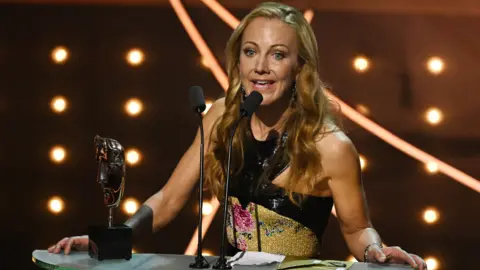 Getty Images
Getty Images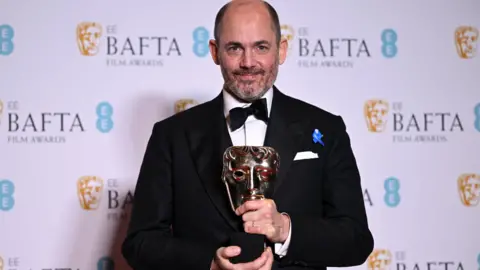 Getty Images
Getty ImagesAll Quiet on the Western Front is a screen adaptation of the 1928 novel by Erich Maria Remarque. In is his acceptance speech for best film not in the English language, Berger said the filmmakers "grew up with a responsibility to tell the story" and were honoured the public had "accepted it with overwhelming love".
He also paid tribute to those fighting in Ukraine and told the audience he was able to get over his own "doubt" about making the film thanks to his daughter Matilda, who had encouraged him after reading the book at school.
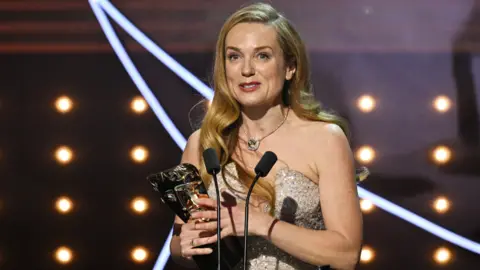 Getty Images
Getty ImagesIrish stars Kerry Condon and Barry Keoghan won best supporting actress and actor, and the movie was named outstanding British film despite its Irish setting and storyline.
After winning that award, director Martin McDonagh initially joked: "Best 'what' award?" But he then clarified the film was eligible for the category thanks to its financing from Channel 4.
He also accepted the prize for best original screenplay. In his speech, he said: "Making such a sad film shouldn't have been this much fun, but it was because of [the cast]."
Dublin-born Keoghan, who spent time in care as a child, dedicated his supporting actor prize to "the kids from the area that I came from who are dreaming to be something".
In her own acceptance speech, Condon told McDonagh: "Thank you for all the parts you've given me throughout my career. They make me feel so proud to be an Irishwoman."
Baz Luhrmann's Elvis Presley biopic was another big winner, also taking home four prizes - best casting, costume design, make-up and hair and best leading actor.
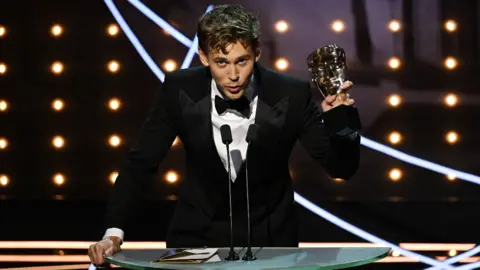 Getty Images
Getty ImagesAustin Butler, who played the legendary singer in Elvis, said in his acceptance speech: "This is truly extraordinary. To my fellow nominees, I am in awe of you. I am so grateful for all these times we've been able to spend together."
He added: "I want to thank the Presley family, I cannot thank you enough for your love. I hope I've made you proud."
Elvis's daughter, Lisa Marie Presley, died last month - shortly after the film triumphed at the Golden Globes.

Where does this leave the Oscars race?
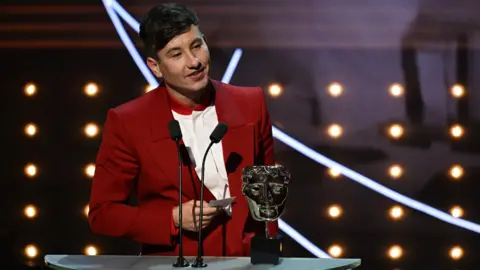 Getty Images
Getty ImagesEven before the Baftas, the brutally violent but critically adored All Quiet on the Western Front was one of the frontrunners to scoop best picture at next month's Oscars. Its endorsement from the British Academy will only add to its momentum.
The bigger surprises at Sunday's ceremony were in the acting categories. Relative newcomer Austin Butler's best actor win could help him edge past his more seasoned competitors, Colin Farrell and Brendan Fraser.
Farrell's loss at the Baftas is particularly notable - many assumed that was the place he was most likely to win. Instead, there were victories in the supporting categories for his co-stars, Kerry Condon and Barry Keoghan.
We will have to wait until 12 March to see if the pair can repeat their surprise wins at the Oscars, where Wakanda Forever's Angela Bassett and Everything Everywhere All At Once star Ke Huy Quan are the firm favourites to take the supporting prizes.
The biggest loser at the Baftas was undoubtedly Everything Everywhere All At Once - taking just one of the 10 awards it was nominated for. The madcap sci-fi adventure has more nominations than any other film at the Oscars, but the sweep many were predicting now looks less likely.

Cate Blanchett was named best actress for her performance in Tár, in which she plays a renowned orchestra conductor whose career unravels when she is accused of abuse.
The Australian actress said the past 12 months had broken down the idea that women's experiences are not "monolithic", adding that her role as Lydia Tár "was a dangerous and career-ending potential undertaking".
She also thanked her mother and the film's director Todd Field, adding that 2022 had been an "extraordinary year for women".
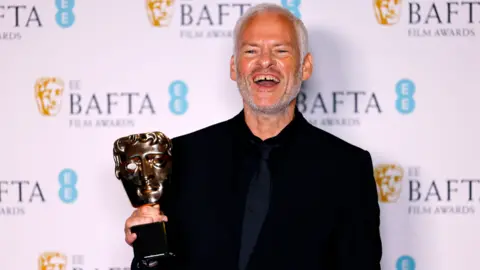 PA Media
PA MediaEarlier in the night, Carey Mulligan was incorrectly announced as the winner of best supporting actress before it was corrected to Condon.
Deaf actor Troy Kotsur, who won a Bafta last year for Coda, was announcing the winner using sign language and an interpreter when the mix-up occurred. It was edited out of the later broadcast on BBC One.
Elsewhere, there were wins for Guillermo del Toro's Pinocchio (best animated feature), Babylon (best production design) and Aftersun (outstanding British debut).
As Aftersun director Charlotte Wells held up her trophy on stage, she joked: "My mum is here, this is for you... literally, because I overpacked."
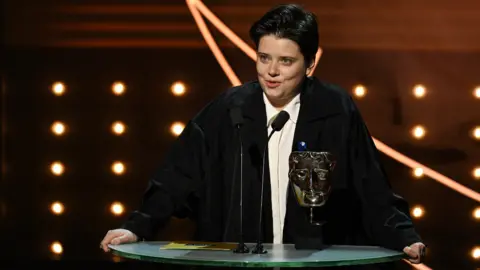 Getty Images
Getty ImagesNavalny won best documentary, and producer Odessa Rae used her acceptance speech to pay tribute to investigative journalist Christo Grozev, who could not be at the ceremony due to "a public security risk".
Grozev, who features in the film about the poisoning of Kremlin-critic Alexei Navalny, claimed during the week that Bafta had withdrawn an invitation after acting on police advice.
The Boy, The Mole, The Fox And The Horse, adapted from the illustrated book by Charlie Mackesy, won the Bafta for best British short animation.
Mackesy praised those involved in the adaptation and hailed those who strive to be "kind" and "brave" in life.
Sex Education star Emma Mackey won the rising star prize, calling her win "really special" and thanking "all the casts and crews I've had the privilege of working with thus far".
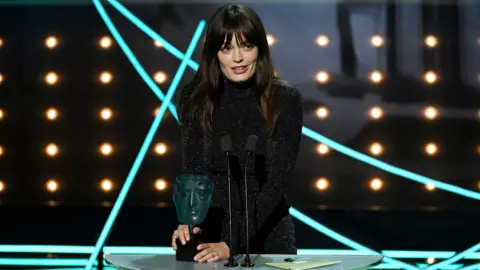 Getty Images
Getty ImagesPrior to Sunday's wins for All Quiet On The Western Front, the record for the most Baftas for a non-English language film was held by Italian coming-of-age drama Cinema Paradiso, which scooped five in 1991.
The ceremony was hosted by Richard E Grant, who gave an assured and self-deprecating performance, with jokes that landed well with the audience.
Read more about the 2023 film awards season:
- How to watch 2023's Oscar-nominated films
- Oscars deeply impacted by racism, actress claims
- Riseborough says Oscars row deeply impacted her
- Oscars 2023: The nominations in full
- How a champion triathlete found cinema success
- Oscars class photo: 10 things we spotted
- The 'turmoil' of being a gay teacher in the 1980s
- Oscar-nominated film tackles transphobic harassment
- Multiverse adventure leads 2023 Oscar nominations
